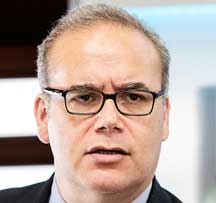Food Systems Podcast 48
In discussion with Máximo Torero
Monday, May 08, 2023
This edition of the Food Systems Podcast features a discussion with Máximo Torero, Chief Economist of the Food and Agriculture Organization of the United Nations (FAO). We explore his views on the urgent need to accelerate food systems transformation and what it would take to improve the scale and speed of change.
At our Annual Conference we heard an impassioned plea to accelerate the transformation of the food and agriculture system. What’s your perspective on that?
We are not resolving the problem of chronic hunger, and the numbers keep growing. The agri-food system is not transforming to create the efficiencies we need for nature and the environment, especially to avoid potential climate change shocks. It’s an important point in time to identify the challenges.
To what extent is Europe providing leadership and what is the impact of that outside Europe, especially the global south?
Europe is trying to identify a road map and making significant efforts in terms of legislation. We need to understand both the concept of a global public good and that what is happening in Europe will have consequences for other regions of the world.
If we transition towards producing fewer emissions, and we don’t consider the need to feed more people with healthy diets, we will create significant consequences for food costs and food availability.
Is the debate about more than production, and about having the right food in the right places at the right time?
We produce enough calories, but we do not produce enough commodities to provide all the food groups to achieve access to healthy diets for all. The challenge is to produce more with less, meaning fewer inputs and resources.
Around a third of the world’s food is lost or wasted. The way food is destroyed creates more greenhouse gas emissions than were used to produce it. Consumers buy more food than they need. We need optimal legislation that assures safe and healthy food but also allows us to expand the life of the food. The major losses happen in high-value commodities which are often produced by small farmers. This is where we need to bring technology innovation.
Reduction of losses is central. It’s a triple win of better resources, more availability of fruits and vegetables and emissions reduction.
Looking holistically, what is getting in the way of making this transition at the scale and speed that is needed?
In the past few years, we have been affected by too many shocks which means we have not been able to really think about the medium and long-term policies that are needed. The agri-food system is very vulnerable, and we need to increase its resilience. There are two components to that. The first is early warning that allows us to be prepared for a shock. The second is how we can create capacity to absorb the shock.
Can we get better at forecasting global challenges and putting in place mitigation steps?
We have progress, for example, we can forecast price volatility. FAO has significant predictive capability for when local shocks might hit, so countries can be made more resilient. We are working now on scaling up our early warning systems. If you can improve predictability, that brings insurance into play.
Many actors are part of the food and agriculture system in terms of building resilience. Do we need to broaden our definition of what the agri-food industry is?
At FAO, when we refer to agriculture and food systems, we include everything involved in producing not only food but also non-food activities like fibres, textiles and biofuels. We need to bring all this in because it all affects nature, and the non-food part creates income that allows us to improve food access. We need a system that provides food and other agricultural commodities in a more efficient way while minimizing trade-offs.
Finally, what gives you cause for optimism?
The world has been through a few crises, and we have learned a lot; they have highlighted the importance of the market structure and especially the interlinkages between energy and food. This is helping us to better plan. We need progress on coordination, so we optimise synergies rather than duplicate. We need to repurpose regulatory support towards proper incentives to achieve the goals we want. And we need to understand that food is a human right.
If you have found this short summary interesting, there’s lots more to hear in the full 36-minute conversation. It is available now on iTunes, Podbean or Spotify or on this website.

Máximo Torero Cullen
Mr. Maximo Torero Cullen is the Chief Economist of the Food and Agriculture Organization (FAO). He joined...see more
